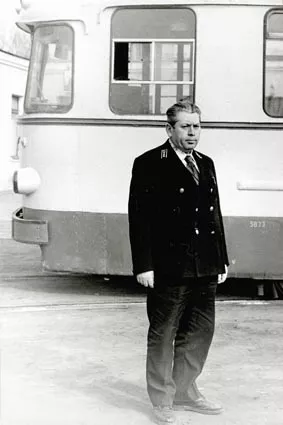This photograph taken in Leningrad in 1975.
One day after my return to Leningrad I heard by the radio that the trolleybus depot invited people for apprentice training. I decided to become a trolleybus driver. At that time that trolleybus depot was the only one in the city. 5 years later I became a 1st class driver. When the 2nd trolleybus depot was opened, I was sent there as the best driver. I worked and at the same time studied at the evening courses of the Leningrad Electromechanical School. I got a diploma of specialist in operation and repair of municipal electric transport. When there appeared trams in the city, I finished courses of tram drivers. Later I worked as a chief inspector for electric transport safety regulations. In 1985 I retired on pension [in the USSR and in Russia men can retire on a pension at the age of 60].
Here I’ll tell you about my wife and son.
I got acquainted with my wife Haya Wolfovna (here people call her Faina Vladimirovna) after the end of the war. Her sister was married to my cousin. I used to visit them. I wanted to find a woman having a place for living, but I did not manage. Neither I nor she had a place for living, therefore we rented a room in a semibasement. Then we got married. I had only a soldier's blanket with me. We had no money to arrange our wedding. So our relatives collected money and helped us with a modest wedding procedure (not religious, of course). It happened on the New Year's Eve.
My wife was born in Polotsk. She studied at the Belarus school, therefore she could speak Belarus language, but at home they spoke Yiddish. Her father was a qualified tailor, and her mother worked as a dressmaker. Their family was well-to-do. Right before the beginning of the war they bought a big house. When Germans started bombardment of Polotsk, they hid themselves in the special self-made dugout.
Father of my wife was a clever person. One day he and his family went to a bombproof shelter situated near the railway station. After the white alert he heard announcement that the last train to the East was leaving in one hour. My wife's father appeared to have a head on his shoulders: he took his 3 daughters and his wife to the railway station immediately, not dropping home. They all squeezed themselves into the freight car: mother, father and their children. It happened one warm summer day (June 30, 1941). That was the way they left for Totsk of Chkalovsk region carrying nothing with them. But they managed to escape. In evacuation my wife's father worked in a military workshop (he cut out overcoats).
In our semibasement we lived for about a year. Later we got a room (we were on the waiting list). My wife worked as a chief accountant of the central chemist's warehouse. Her salary was 61 rubles (the sum was not great; you can compare it with 120 rubles - salary of an engineer).
In 1961 our son was born. He studied very well, he was a good sportsman. Later he entered a College, having passed through the exams. He got excellent marks for all examinations, except composition (there he made 1 mistake). It was the College of paper-cellulose industry. Leonid knew that he was a Jew, but did not care. We did not bring our son up as a Jew. He was sociable and cheerful.
I'm also a cheerful person, but wronged by my life.










